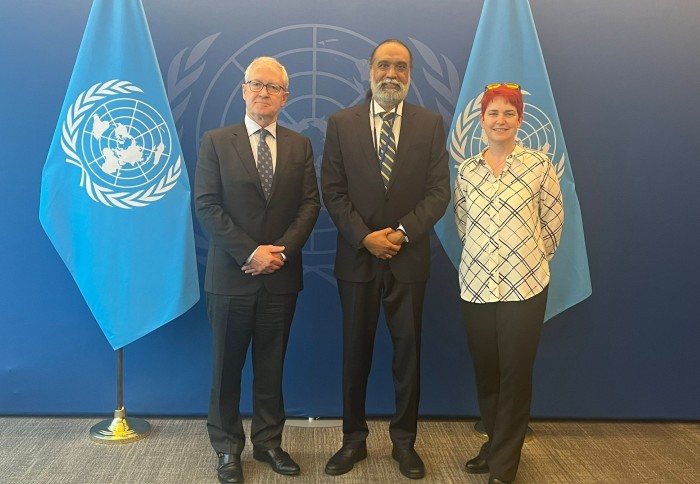Imperial and UN leaders meet to tackle development challenges

Imperial's leaders met the UN's Amandeep Singh Gill
Leaders from Imperial and the UN met to explore ways the College can support efforts to tackle development challenges.
Imperial’s President, Professor Hugh Brady and Vice Provost (Research & Enterprise) Professor Mary Ryan met with UN officials in New York to discuss how science and technology can contribute to major global issues such as health, climate and food security.

Imperial’s leaders held meetings with Grace Wood, First Secretary & Head of Sustainable Development at UK Mission to the UN, Achim Steiner, UNDP Administrator, and Amandeep Singh Gill, UN Secretary-General's Envoy on Technology.
Imperial has consultative status at the UN Economic and Social Council (ECOSOC) which sees the College’s community closely engage with ECOSOC to contribute towards policymaking, hold joint events with the UN, and advance the Sustainable Development Goals through research and collaboration. The UN’s ECOSOC coordinates the economic, environmental, social, and related work of the 15 United Nations specialised agencies.
The meetings this week form part of a broader visit by Imperial leaders, who are meeting key partners and Imperial alumni in New York and Boston.
Development Partnerships
Imperial researchers from Medicine, Engineering and Life Sciences at Imperial are collaborating with the West African Centre for the Cell Biology of Infectious Pathogens (WACCBIP) at University of Ghana to create novel rapid malaria diagnostic linking detection and surveillance.
The Digital Diagnostics for Africa Network is a network of multi-disciplinary scientists working with commercial companies that manufacture diagnostics to put new disease control tools and strategies into practice (SDG3).
Imperial academics are also collaborating with UNDP Accelerator labs around water and sanitation and flood management. The UNDP labs are focused on working with policymakers and innovators in developing countries to forge solutions to local challenges in order to achieve the Sustainable Development Goals (SDGs) by 2030. Imperial's Global Development Hub have placed PhD students in UNDP Sierra Leone and UNDP Indonesia.
Experts from Imperial, the University of Ghana and the Impact Hub Accra partnered in an initiative to develop student entrepreneurs. The project, which was led by Imperial's Enterprise Lab and supported by the British Council, focused on co-creating a student entrepreneurship programme to enable students to develop successful businesses.
Global Development Hub
In 2021, Imperial launched its Global Development Hub to accelerate the global impact of its world-leading research, education and innovation.
The hub supports Imperial's contribution to the United Nations Sustainable Agenda 2030, and the College's work more broadly with some of the most vulnerable and marginalised in societies where multiple global challenges are acutely concentrated.
Professor Hugh Brady, President of Imperial, said: “As one of the world’s leading universities, Imperial is uniquely placed to help tackle urgent global challenges like climate change and pollution, global epidemics, world hunger and access to clean water. This kind of societal impact drives everything we do.
"Through Imperial's special consultative status and Global Development Hub our community is already engaging closely with the UN to find ways of solving the most pressing challenges and meeting the Sustainable Development Goals.
“I was pleased to discuss our shared commitment to these ambitions with UN colleagues. Together, we can deliver transformative impact on a global scale.”
Article text (excluding photos or graphics) © Imperial College London.
Photos and graphics subject to third party copyright used with permission or © Imperial College London.
Reporter
Stephen Johns
Communications Division
Deborah Evanson
Communications Division